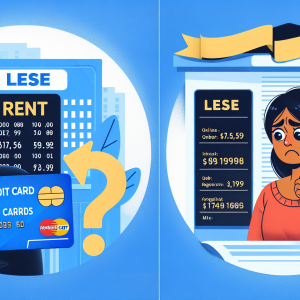In today’s digital age, the convenience of using credit cards for various transactions is undeniable. From everyday purchases to large expenses, credit cards offer flexibility and ease of use. One area where this convenience is increasingly being explored is in paying rent. While paying rent with a credit card can offer several benefits, it also comes with a set of potential drawbacks. This article delves into the advantages and potential downsides of using credit cards for rent payments.
Advantages of Paying Rent with Credit Cards
Paying rent with a credit card can provide significant rewards, particularly if you use a card that offers cashback or travel points. By channeling a large recurring expense like rent through your credit card, you can accumulate rewards at a faster rate. This can be particularly advantageous for those who are disciplined in paying off their credit card balance each month, as the rewards can offset other costs or even fund your next vacation.
Another major advantage is the convenience and flexibility that credit cards offer. For instance, if your paycheck timing doesn’t perfectly align with your rent due date, using a credit card can help bridge the gap without causing any disruption. Credit cards also provide an easy way to automate payments, ensuring that you never miss a due date and avoid potential late fees charged by landlords or property management companies.
Lastly, using a credit card to pay rent can help improve your credit score, provided you manage your payments responsibly. Regular, on-time payments contribute positively to your credit history, which can be beneficial for future financial ventures such as taking out a loan or mortgage. Additionally, maintaining a good credit utilization ratio by not maxing out your credit limits can further enhance your credit profile.
Potential Downsides of Using Credit for Rent
Despite the benefits, there are notable potential downsides to paying rent with a credit card. One primary concern is the transaction fees that can be associated with these payments. Many landlords or property management companies charge a convenience fee for credit card payments, which can range from 2.5% to 3% of the rent amount. Over time, these fees can add up and negate the benefits of any rewards earned through your credit card.
Another drawback is the risk of accumulating debt. Rent is typically a significant monthly expense, and if you are unable to pay off your credit card balance in full each month, you may find yourself accruing high-interest debt. This can lead to a cycle of financial strain, as interest charges compound and the debt becomes more difficult to manage. It is crucial to assess your financial stability and ensure you can pay off your balance before opting to charge your rent to a credit card.
Moreover, some tenants might face credit score implications if they experience financial difficulties. Missing a credit card payment because of high rent expenses can result in late payment fees and negatively impact your credit score. Unlike other forms of payment, such as direct debit from a bank account, the stakes are higher with credit cards, as the interest rates and penalties are more severe.
In summary, paying rent with a credit card offers a mix of benefits and drawbacks that warrant careful consideration. On the positive side, it can provide substantial rewards, convenience, and the potential to improve your credit score. However, the associated transaction fees, risk of accumulating debt, and potential negative impact on your credit score cannot be overlooked. As with any financial decision, it’s essential to evaluate your personal circumstances and weigh the pros and cons before deciding if this payment method is right for you. By doing so, you can make an informed choice that aligns with your financial goals and stability.
